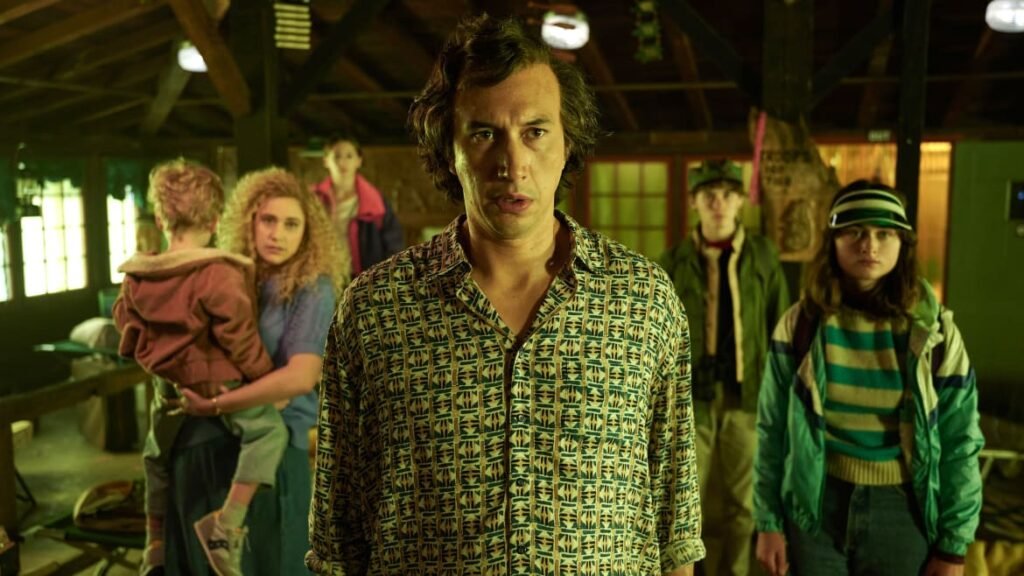You’ll wish to keep by the tip credit of White Noise, filmmaker Noah Baumbach’s adaptation of Don DeLillo’s much-ballyhooed novel exploring the torpefying results of mass consumerism, expertise, and medical quackery on the American household. It’s a sequence straight out of David Byrne’s Broadway romp American Utopia, bursting with ingenuity and playfulness, set to a catchy new tune by LCD Soundsystem. It additionally says extra about how in thrall we’re to consumption than the remainder of the film mixed.
White Noise is informed from the angle of Jack Gladney (Adam Driver), chairman of the Hitler Research division at fictional Faculty-on-the-Hill. The 12 months is 1984, and we’re 16 years into his tenure—one marked by adulation from his fellow colleagues and college students alike. Gladney is an imposing determine (see: Driver), dazzling his college students with histrionic lectures and stalking the hallways in a black gown, although his propensity for hiding his palms beneath it, and cloaking himself in polarized sun shades, suggests a lingering insecurity. His spouse is Babette (Greta Gerwig), a seemingly content material mom presiding over a combined brood of kids and stepchildren with a fully superb head of curly blonde hair. Her secret dependancy to a thriller prescription capsule known as Dylar, nevertheless, signifies that there’s nervousness effervescent beneath her cheery floor.
This opening chapter sees Baumbach in acquainted territory: dismantling the pretensions of academia, the place professors luxuriate in language in ways in which really feel masturbatory to anybody outdoors their finely constructed bubble. It opens on Professor Murray Siskind (Don Cheadle, excellent) gushing over an orgiastic montage of film automotive crashes, casting them as a paragon of American “optimism” and urging his acolytes to “look previous the violence”—laughably absurd recommendation, after all. An early spotlight comes by way of dueling lectures from Gladney and Siskind juxtaposing the lives of Elvis and Hitler, positing that their mommy points led to a starvation for mass adoration. Parallels will inevitably be drawn between Gladney and Bernard Berkman, the trainer and literary dinosaur embodied by Jeff Daniels in The Squid and the Whale whose ego is just outmatched by his love for the Knicks, even when Gladney is much much less of a cultural Luddite (Berkman was loosely primarily based on Baumbach’s personal father, a fiction author who later taught at Brooklyn Faculty).
When a truck loaded with poisonous chemical substances plows right into a practice, a “black billowing cloud” with flashes of purple varieties over their pastoral city. Dubbed “The Airborne Poisonous Occasion,” the environmental disaster sends Gladney, Babette, and their clan—together with the remaining—to a far-away quarantine web site known as Camp Daffodil. It’s right here that Gladney involves the belief that his kids are smarter and extra confident than he and Babette, and the movie’s tone (and images) shifts to a science-fiction sendup within the vein of early Stranger Issues, casting its characters in glowing lights, caliginous shadows, and extensive photographs. This chapter is the place White Noise begins to unravel, as Baumbach loses sight of DeLillo’s sharp satirization of American mores within the trappings of interval sci-fi.
White Noise is definitely Baumbach’s most formidable outing up to now—a sprawling critique of U.S. tradition and its enslavement to consumerism, tabloid fictions, miracle “cures,” and the ability of expertise, all of which have led to the disintegration of household buildings. In our present pandemic hellscape—what with a lethal airborne virus, mass paranoia, quarantining, doomscrolling on social media, pill-pushing grifters, and Amazon deliveries—the fabric couldn’t be timelier. It’s too dangerous, then, that the movie’s makes an attempt at social commentary are largely misplaced amid its turgid verse and meandering plot. Very similar to Cosmopolis, David Cronenberg’s 2012 stab at DeLillo, White Noise is just too enamored of the creator’s reward for fanged, sardonic dialogue, rendering its personal indigestible.
“Household is a cradle of the world’s misinformation,” Gladney asserts again and again. And Baumbach stays gifted at dramatizing the pangs of familial dysfunction, as when Driver and Gerwig (terribly underutilized) bicker in mattress over using “entry” as a time period for intercourse in dime-store romance novels, or in his earlier movie Marriage Story, a pointy, achingly private portrait of marital destruction. White Noise is the filmmaker working at a distracted take away—one which by no means manages to seize the correct frequency.
White Noise will debut in theaters on Nov. 25 and stream on Netflix Dec. 30.
Learn extra at The Day by day Beast.
Get the Day by day Beast’s greatest scoops and scandals delivered proper to your inbox. Join now.
Keep knowledgeable and acquire limitless entry to the Day by day Beast’s unmatched reporting. Subscribe now.



